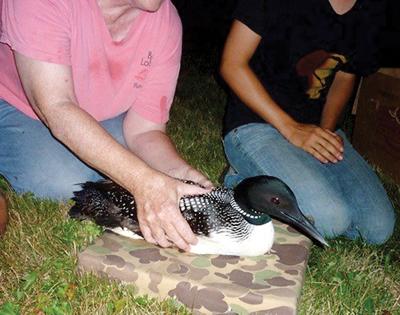Many of us have found a bird lying on the ground, or on a sidewalk, or in a parking lot and we always want to help. The first thing is to decide if it’s a new fledgling. If it is a baby bird, it’s almost always best to leave it alone. Many birds leave the nest before they’re completely independent because they’re much less vulnerable to predators if they’re scattered around rather than clustered together in a nest. The fledglings and their parents roam together for days or even weeks before separating, with the parents continuing to find food and guard against danger. Many of the young birds that are “rescued” by well-meaning humans are actually taken from their vigilant parents.
If it’s not a young bird, then it’s a bit trickier. Most of us don’t have the training or expertise to make an on-the-spot assessment and determine the perfect course of action. But if the bird is bleeding or dragging a wing on the ground or has difficulty walking, it needs expert help. Call a wildlife rehabilitator before lifting or moving the bird. The Vermont Fish and Wildlife website has a list of rehabilitators as well as a helpful article. Visit vtfishandwildlife.com, click on their “Learn More” link for an “Injured and Orphaned Wildlife” information page for the list of licensed wildlife rehabilitators. They are dedicated and amazing people, but they aren’t “on staff” sitting by office phones waiting for calls. They might not always be able to get back to you immediately. If you don’t get an answer, try another number on the list.
Even more important than knowing how to help an injured bird is actively preventing injuries in the first place. The unfortunate fact is that where there are humans, there will be injured birds. Birds get hit by cars or caught up in the wind from big vehicles. They fly into power lines, wind turbines and, even more disastrously, windows. Up to a billion birds die every single year from hitting windows. If you’ve had window strikes at your home or office, you can read a summary of preventive methods at abcbirds.org, read the post titled, “Stop Birds Hitting Windows.”
Even more important, keep your cats indoors. Domestic cats are the most abundant carnivore in North America, and they kill as many as a million birds a day.
Our native birds evolved without a fast-moving feline predator on the ground, a predator that can also climb trees and is hard-wired to stalk, catch and “play with” little creatures even when it’s not hungry.
I had cats for decades, as many as nine at once. I was the person to whom people brought abandoned cats. And I dearly loved my pets. Little Scoutie, wonderful MacIntosh Jeff, bizarre little Goblin, cuddly Callie – they still show up in my dreams from time to time and I always wake up smiling. When we lived in a tiny house, we had three indoor cats. After I moved to a bigger place, with a yard, I built a good-sized dog run outside, covered it with chicken wire, and connected it to the laundry room with a little cat door. My cats could be outside, enjoying grass and sun and breezes and all the wonderful smells, and “my” birds would be safe.
Enjoy birds. Save birds. And protect birds.
Maeve Kim, a local bird expert and author, loves birds. She watches birds, feeds birds, travels to see birds, teaches about birds, and writes about birds. In her latest novel, “Ivy’s Optics,” every character is either a bird or a birder. For more birding photos and adventures, visit vtbirdsandwords.blogspot.com.






















(0) comments
Welcome to the discussion.
Log In
Keep it clean. Please avoid obscene, vulgar, lewd, racist or sexual language.
PLEASE TURN OFF YOUR CAPS LOCK.
Don't threaten. Threats of harming another person will not be tolerated.
Be truthful. Don't knowingly lie about anyone or anything.
Be nice. No racism, sexism or any sort of -ism that is degrading to another person.
Be proactive. Use the "Report" link on each comment to let us know of abusive posts.
Share with us. We'd love to hear eyewitness accounts, the history behind an article.